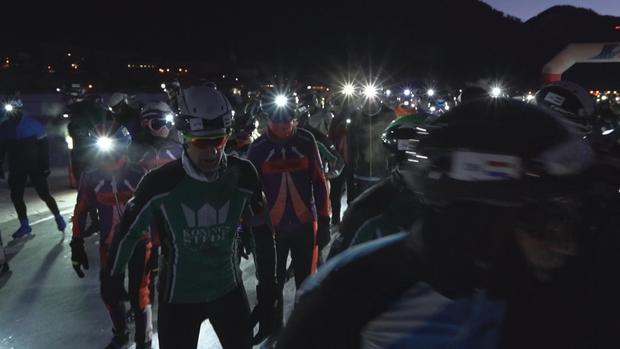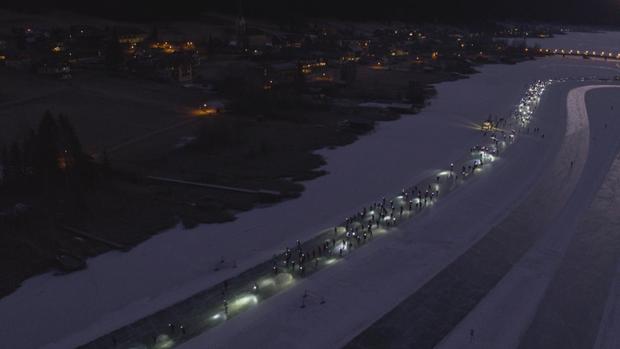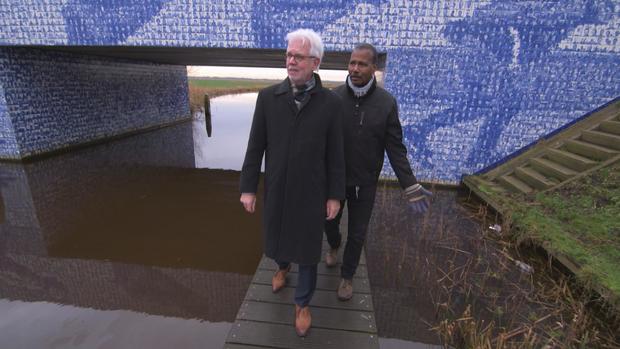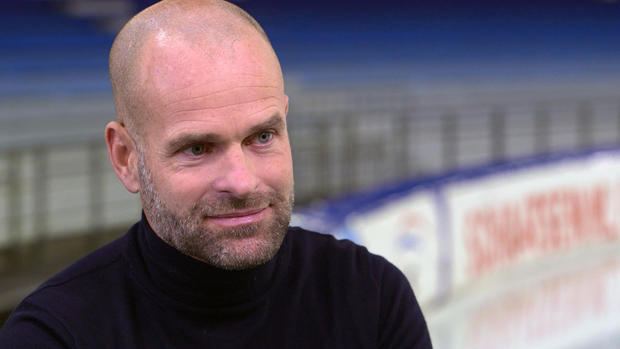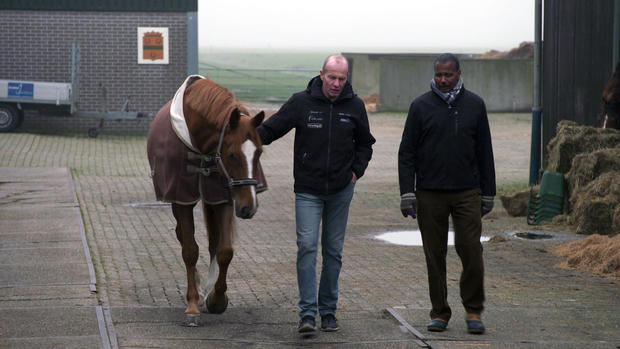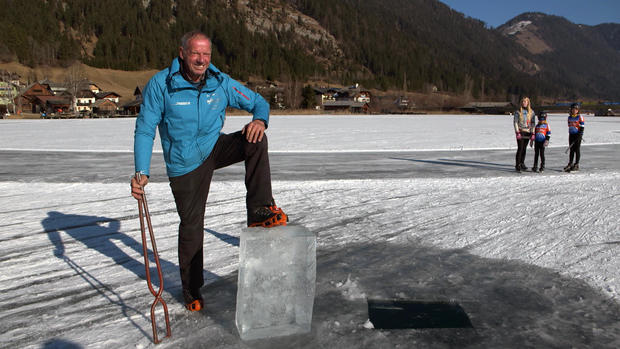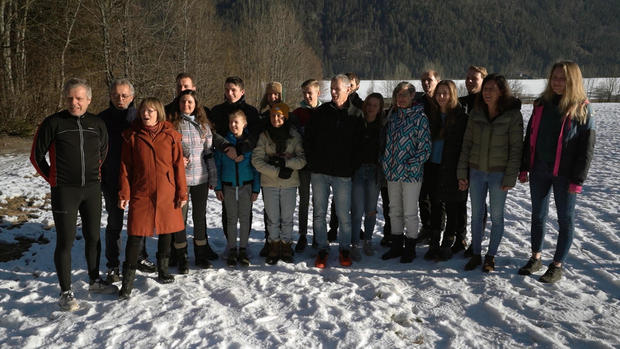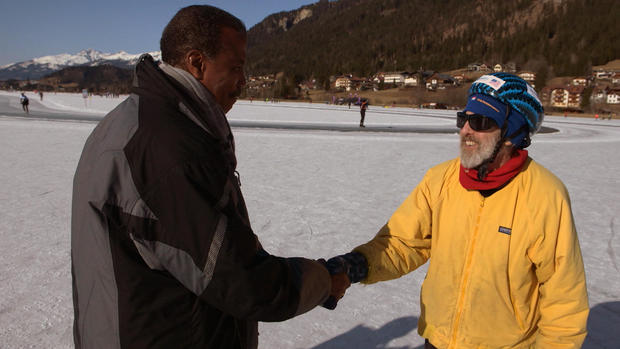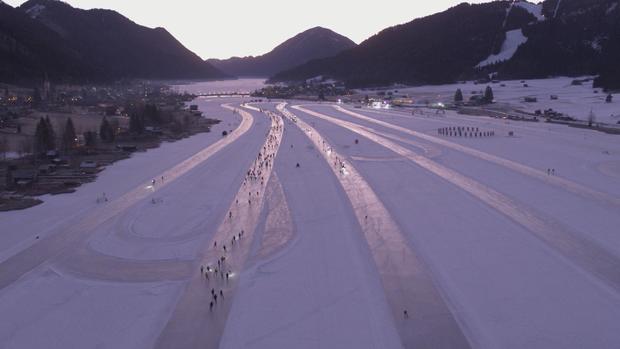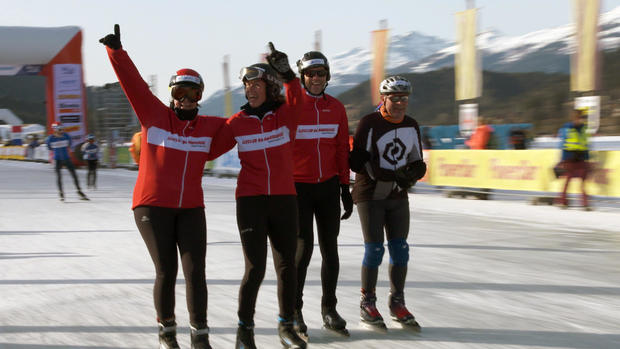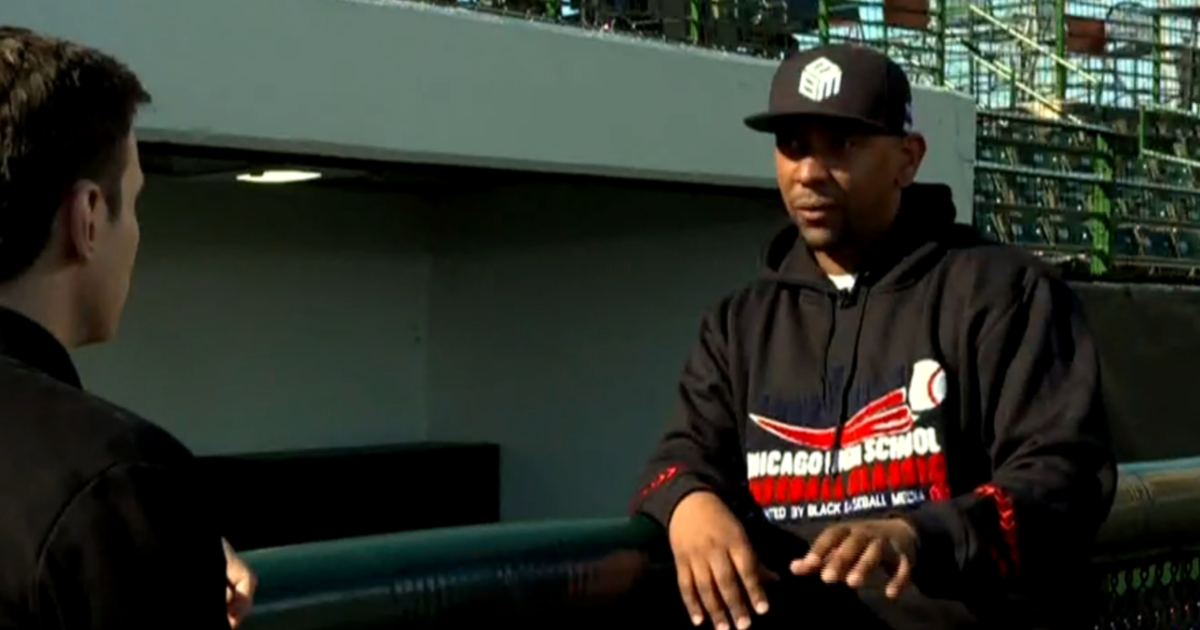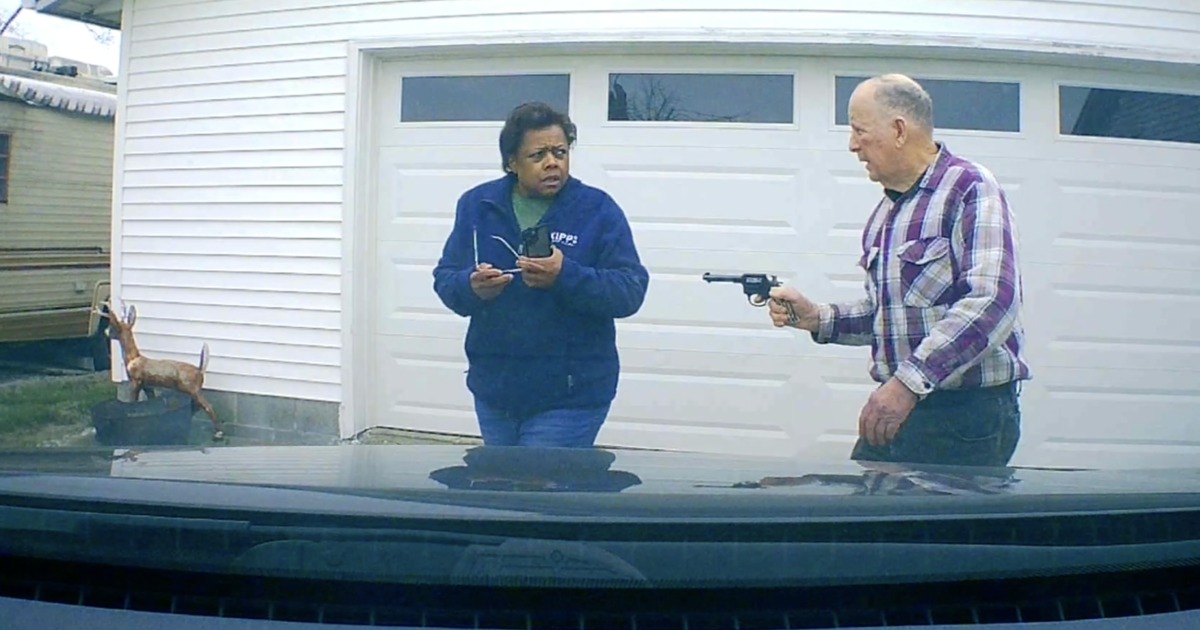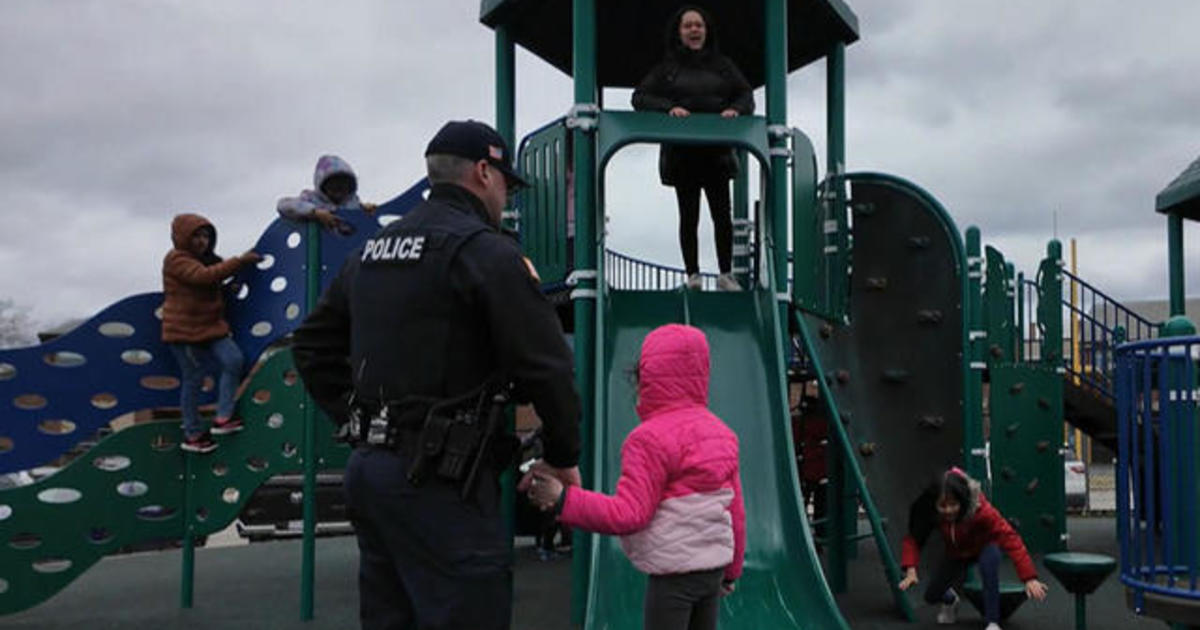Elfstedentocht: The outdoor skating race that brings the Netherlands to a standstill
No one is more crazed about speed skating than the Dutch. And no competition inspires more frenzy than the Elfstedentocht. It's a mouthful to say and takes some practice — Elfstedentocht. It means the 11-city tour. It's a punishing, 125-mile race that links 11 cities along frozen canals, an epic test of endurance that's been a sacred part of Dutch life since 1909. The winner becomes an instant celebrity, there are no bigger heroes in the Netherlands. Now the legendary race is under threat, but the Dutch will go a long way to keep the tradition alive.
At 6 a.m. on race day, thousands of Dutch skaters shiver in the dark, steeling themselves for the marathon ahead. Goggles protect against the freezing cold. Headlamps are the only way to spot the dangerous cracks in the ice. Jockeying for position, the racers push towards the starting gate.
At the gun, they stream eagerly into the darkness. From the air, it looks like rush hour. Careening around tight corners, the skaters fight for every inch.
But these Dutch skaters aren't in the Netherlands where the Elfstedentocht is supposed to happen - they're 750 miles away on a lake in the Austrian Alps.
Back in Holland, winter is just not showing up the way it used to.
"I feel extremely disappointed because I know it's not going to happen this winter," Elfstedentocht chief organizer Wiebe Wieling said.
Wieling has the thankless job of working all year preparing for the Elfstedentocht as if it's going to happen. His group even has a dedicated national weather forecaster on high alert for freezing temperatures. There's no fixed date, it just needs to get cold enough. And that hasn't happened in Holland for 23 years.
"In your lifetime," correspondent Bill Whitaker asked Wieling, "Have you seen the weather change? The winters change?"
"Yes," Wieling said. "We see less winters and less severe winters. It's changing."
Whitaker met Wieling at the bridge of tiles, where the grip of this race on the national psyche is on full display. Anyone who ever finished the Elfstedentocht is immortalized there. Wieling raced it twice.
"I know the day I got married, but the two days I raced are even bigger," Wieling said. "My wife is not here, so I can say it. That's the way it is for most of the participants."
There's even a term for this skating obsession: Elfstedentocht Fever. As soon as the temperature drops, the Dutch start praying for ice.
But these days you're more likely to find ice indoors. Global warming has slashed the chances of another Elfstedentocht happening in Holland to a sliver.
For world champion skater Erben Wennemars, that cuts right to the heart.
"People ask me, like, would you give all your medals away for one Elfstedentocht. Of course," Wennemars said.
Wennemars has two Olympic medals, six World Speed Skating Championships and has been a national champion in the Netherlands.
"All given away. For sure," Wennemars said.
"You would give that all away to run this race?" Whitaker asked. "It's that important to you?"
"Yeah," Wennemars said. "I think it comes so close to what sports is all about."
He said his biggest regret was that he's never skated the Elfstedentocht in Holland. He was away at the 1997 World Cup last time and he worries there might not be another chance on home ice.
"That would be a loss for Holland. A big loss for Holland," Wennemars said. "A loss for our tradition, of our culture. It's who we are. It's what we do. We skate."
The last Elfstedentocht in Holland is now the stuff of legend. Sixteen-thousand skaters strapped on their blades. Millions took the day off and cheered as a brussels sprouts farmer named Henk Angenent sprinted the last few yards to win.
"Yeah, yeah it was crazy," Angenent told Whitaker, "But I had a super day."
He had skated 125 miles, without stopping, in less than seven hours.
"Six hours, and 49 minutes and 11 seconds," Angenent said.
It's not just a race?" Whitaker asked.
"No, no, no," Angenent said.
Overnight, he became a star. There's no prize money, but with his newfound fame, he traded sprouts for show jumping horses. The race, he told Whitaker, changed his life.
"The day before the race, nobody knows your name," Whitaker said. "The day after the race…"
"Everybody," Angenent said.
"Everybody in the Netherlands knows who you are," Whitaker said. "What's that like? You're a hero."
"Yeah, yeah, I'm hero," Angenent said. "But I'm still Henk Angenent."
Now a coach, Angenent was among the thousands of Dutch skaters who packed up and poured into Austria for the relocated race, called the Alternative Elfstedentocht. Sitting high in the Alps, tiny Weissensee, a village of 700, balloons to 6,000.
It's a friendly invasion. There are boisterous Dutch pep rallies ahead of the race, plenty of Dutch treats and lots and lots of traditional singalongs.
How the race ended up there is partly due to the ice meister of Weissensee, Norbert Jank. In 1989, he helped persuade a visiting Dutch businessman that Weissensee always had good ice. This year the ice is ten inches thick. Perfect for holding the thousands of skaters, Jank said.
This yearning for ice is why the Blom family made the trip. Whitaker met them getting down to the business of carb loading ahead of the race. They had driven 11 hours from the Netherlands and there were several of them. The youngest, 10-year-old Jenrique, was aiming to skate 60 miles.
"And I hope to skate with my mom," he said.
Johan Blom explained what the race meant to them.
"The biggest sport events in America," Johan said, "What is it again?
"The Super Bowl," Whitaker told him.
"Yeah, the Super Bowl. America kind of comes to a standstill. And that times three would happen if the Netherlands would have an Elfstedentocht," Johan said.
"I think the Netherlands must be the only country in the world where people hope and pray for a really cold winter," Whitaker said.
The Bloms conceded it helped to be Dutch.
"You get up early in the morning. It's dark," Whitaker said, "There's always an injury. It's like everybody gets blisters. What's the attraction?"
"Everybody on the ice is 50% more friendly than at other times," Leonard Blom said. "And it's so nice."
"It's the suffering together in the end that keeps you going as well, Janika Blom said. "Because there's definitely suffering involved I can tell you."
But nothing seems to stop the Dutch when it comes to skating. One veteran racer fixed blades to his walker.
As the sun climbed higher, the pack thinned out – and crashed out. The top racers going the full 125 miles still clung together. But some of the Bloms – and many others – were just trying to reach their personal best. Like Howard Morris, a librarian from Minnesota and the lone American in the race.
"I heard that you called yourself a slow speed skater," Whitaker said, "Explain that to me."
"You'll notice a lot of the Dutch people are very tall, much taller than I am," Morris said. "Which gives them longer legs, which also gives them the ability to do a long stroke with their legs."
Morris told Whitaker he'd started speed skating in his forties. When he dreamed of doing an Elfstedentocht, a Dutch friend told him he'd have to go to Austria.
"What do you think of the fact that they've not been able to have an Elfstedentocht in the Netherlands since 1997?" Whitaker asked Morris.
"It's the reality of the times, and I know some people fear that the whole tradition of skating, which is part of their culture, will die out because of the change in winters," Morris said.
Even in the Alps there are worrying signs. While Weissensee had ice, the village had almost no snow. And this year's race was limited to only half of the lake, the ice wasn't thick enough elsewhere.
In full swing, it's hard to tell who was winning or losing. But for the racers going on six hours, none of that mattered. What mattered now was not falling. Getting back up. And finishing. Howard Morris made his goal of 30 miles.
"What's the best part about it for you?" Whitaker asked him.
"It was kinda fun to hear my name announced as I crossed the start and finish line," Morris said.
The winner of the marathon blew by the finish line and collapsed, exhausted. But you might too if you'd been skating for seven hours nonstop. After the thrill of victory came the agony of the feet. Some crumpled into the arms of supporters. Others just ignored aching muscles. And the Bloms?
"People say that people who do the Elfstedentocht you have to be a little bit crazy," Whitaker said.
"Yeah, it helps," Leonard Blom said.
"So the Bloms are a little bit crazy?" Whitaker asked.
"Oh yeah," Leonard Blom said. "I'm sorry, but it's true."
The Bloms were on the lookout for 10-year-old Jenrique. Finally they spotted his blue jacket. He had skated about 60 miles in just over nine hours.
"You know there have been a couple of broken bones here," Whitaker said. "Somebody got taken away in a helicopter. I mean this can be dangerous."
"It is," Johan Blom said. "If you're tired, you know your coordination is not what you want it any more. You see the crack, but your legs won't do any more what your brain is telling them to do."
As the day faded, the racers summoned the last of their energy. These skaters had watched the sun rise. And now the sun had set.
That night, the skaters were toasted at a traditional Blister Ball. But if they were hurting, it was well hidden. These skaters were still on their feet, drunk with accomplishment.
Back in Holland, race organizer Wiebe Wieling resigned himself to another winter slipped by.
"No ice. No skating," Wieling lamented. "Next year, a new opportunity."
"Hope springs eternal," Whitaker said.
"That's true," Wieling said.
Produced by Heather Abbott. Associate producer, Kate Morris. Broadcast associate, Emilio Almonte. Edited by Warren Lustig.
